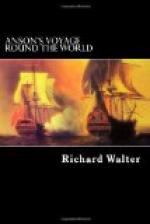groundless, and that they would find a generous enemy
in the Commodore, who was not less remarkable for
his lenity and humanity than for his resolution and
courage. The passengers who were first sent on
board the Centurion informed us that our prize was
called “Nuestra Senora del Monte Carmelo”,
and was commanded by Don Manuel Zamorra. Her cargo
consisted chiefly of sugar, and great quantities of
blue cloth made in the province of Quito, somewhat
resembling our English coarse broad-cloths, but inferior
to them. They had, besides, several bales of a
coarser sort of cloth, of different colours, called
by them Pannia da Tierra, with a few bales of cotton
and tobacco, which though strong was not ill-flavoured.
These were the principal goods on board her; but we
found, besides, what was to us much more valuable than
the rest of the cargo. This was some trunks of
wrought plate, and twenty-three serons of dollars,
each weighing upwards of 200 pounds avoirdupois.
The ship’s burthen was about 450 tons; she had
fifty-three sailors on board, both whites and blacks;
she came from Callao, and had been twenty-seven days
at sea before she fell into our hands. She was
bound to the port of Valparaiso, in the kingdom of
Chili, and proposed to have returned thence loaded
with corn and Chili wine, some gold, dried beef, and
small cordage, which at Callao they convert into larger
rope. The prisoners informed us that they left
Callao in company with two other ships, which they
had parted with some days before, and that at first
they conceived us to be one of their company; and
by the description we gave them of the ship we had
chased from Juan Fernandez, they assured us she was
of their number, but that the coming in sight of that
island was directly repugnant to the merchants’
instructions, who had expressly forbid it, as knowing
that if any English squadron was in those seas, the
island of Fernandez was most probably the place of
their rendezvous.
And now it is necessary that I should relate the important
intelligence which we met with on board her, partly
from the information of the prisoners, and partly
from the letters and papers which fell into our hands.
We here first learned with certainty the force and
destination of that squadron which cruised off Madeira
at our arrival there, and afterwards chased the Pearl
in our passage to Port St. Julian. And we had,
at the same time, the satisfaction to find that Pizarro,
after his utmost endeavours to gain his passage into
these seas, had been forced back again into the River
of Plate, with the loss of two of his largest ships;
and besides this disappointment of Pizarro, which considering
our great debility, was no unacceptable intelligence,
we further learned that an embargo had been laid upon
all shipping in these seas by the Viceroy of Peru,
in the month of May preceding, on a supposition that
about that time we might arrive upon the coast.
But on the account sent overland by Pizarro of his
own distresses, part of which they knew we must have




